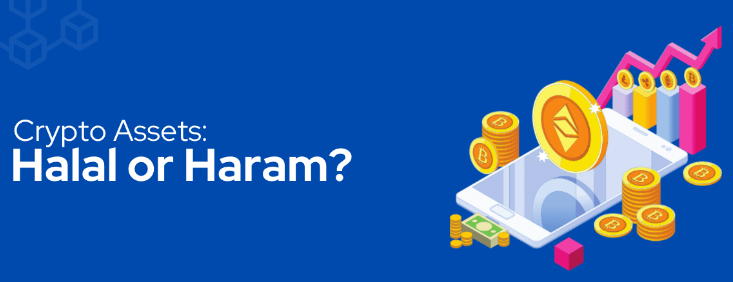Hey everyone, let 🔗
Cryptocurrency has become a sensation in the world of finance, causing both impressive profits and regulatory challenges. However, in Islamic finance, it has ignited a theological debate. People are curious to know whether cryptocurrency is considered forbidden or permissible according to Sharia law.
Sailing through the Sharia Sea: Important Issues Arise 🔗

Cryptocurrency’s permissibility is not a straightforward matter; it requires understanding the complex principles of Sharia. Amidst the ongoing debate, three main concerns emerge:
-
According to Sharia law, charging excessive interest is completely forbidden. While cryptocurrency does not generate traditional interest, its value fluctuations driven by the market raise concerns. Some scholars suggest that this lack of predetermined rates might make it permissible (halal) in this aspect.
-
Maysir: Some people claim that cryptocurrency trading, which involves activities similar to gambling, is often compared to gambling because it relies on speculation and price fluctuations. The absence of underlying assets and centralized regulation contributes to this worry.
-
Gharar, which refers to excessive uncertainty or ambiguity, is a crucial factor to consider when it comes to adhering to Sharia principles. Cryptocurrency, being relatively new and characterized by unpredictable market fluctuations, undoubtedly contains a considerable amount of gharar. This particular aspect gives rise to concerns regarding fairness and transparency, which are essential principles in Islamic finance.
Diverse Coastlines: Different Scholarly Perspectives in the Islamic World 🔗
Scholars from various Muslim countries have different perspectives on cryptocurrencies. While some, such as the Indonesian Ulema Council, consider it as completely forbidden (haram) due to its association with risky and uncertain practices, others, like the Islamic Finance Guru, believe it can be permissible (halal) if individual projects adhere to Sharia principles and avoid engaging in risky, uncertain practices or interest-based transactions.
Transactions versus Speculation: A Nuance Arises 🔗
Furthermore, many experts emphasize the difference between utilizing cryptocurrency as an actual currency for transactions and solely engaging in it for the purpose of making a profit. They contend that the former, in cases where the technology behind it enables ethical transactions, could be deemed acceptable. Conversely, the latter raises more apprehensions due to the speculative aspect of trading.
Taking Personal Responsibility and Maintaining Ongoing Conversations: Mapping the Path 🔗
It’s important to keep in mind that understandings of Sharia may differ depending on the region and school of thought. This variation contributes to the lack of a universal consensus on whether cryptocurrency is considered halal (permissible). Ultimately, it is up to individual Muslims to decide and determine its permissibility based on their own research and guidance from trusted scholars. Conducting thorough research and seeking advice from reliable sources are crucial in making informed decisions that align with personal beliefs and interpretations of Sharia.
Moreover, it is important to approach the ever-changing cryptocurrency landscape with caution. As regulations become more defined and new uses arise, it may be necessary to reevaluate the acceptability of certain projects and practices. It is crucial for scholars, industry experts, and the Muslim community to engage in continuous dialogue in order to navigate this evolving domain with a clear understanding of ethics.
The Bottom Line: A Muddy River, but a Crystal-Clear Reflection 🔗

The question of whether cryptocurrency is halal or haram is not easily answered. It is a complex topic that involves theological nuances and practical considerations. For Muslims exploring this new territory, it is important to use critical thinking, seek knowledge from scholars, and take personal responsibility to ensure their financial choices align with their faith and values. While the world of cryptocurrency may seem confusing, individuals can find clarity in making halal financial decisions through careful contemplation and seeking guidance.